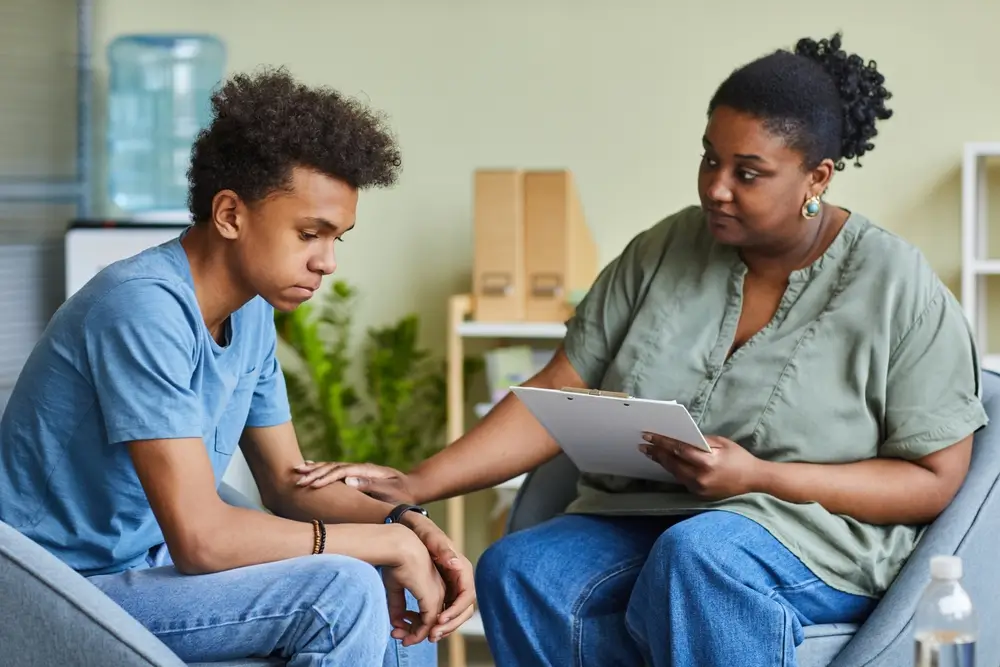Before we look more closely at the causes of depression in schools, let’s examine the most recent statistics on mental health in high school students. What percentage of kids in school are depressed? Research from the Centers for Disease Control (CDC) found:
- 16 percent of US teens (ages 12 to 17)—more than 4 million adolescents—had at least one major depressive episode in 2022.
- In addition, 11.5 percent of US youth (over 2.7 million high school students) are experiencing major depressive disorder with severe impairment.
- 3 in 5 teens with depression received no mental health treatment. In some states, three-quarters of high school students with depression did not receive mental health services.
Even teens who did access care rarely received consistent treatment. On average, fewer than 1 in 3 adolescents with severe depression received consistent care.

Causes of Depression in Schools
School life for teens today can be stressful and even contribute to feelings of depression. Here are a few of the main causes:
- Pressure to achieve: Schools pressure students to achieve high grades and test scores. This can lead to feelings of failure or inadequacy in teens who struggle to meet these demands. The uncertainty of college acceptances and career prospects only amplifies this stress.
- Bullying and difficult social dynamics: Bullying, whether in-person or online, has damaging psychological effects and can cause depression. For shyer students, the social challenges of navigating peer relationships and cliques in high school can also be an immense source of anxiety and sadness.
- Lack of downtime: Many teens have almost no opportunity to rest and recharge between the demands of school, homework, extracurriculars, and part-time jobs. This constant overscheduling and lack of leisure time contribute significantly to feelings of burnout, irritability, and depression.
- Lack of coping skills: Today’s teens have been protected from failure and struggle, leaving them ill-equipped to cope with the stresses and setbacks of high school life healthily. Without developing resilience and effective coping strategies, normal disappointments and challenges can seem catastrophic and lead to feelings of hopelessness.
- Nature deficit disorder: Spending less time outside in nature can contribute to depression in teens. Teens today often have limited exposure to natural environments, sunlight, and green spaces. This “nature deficit disorder” is linked to behavioral and mental health issues like depression.
- Social media effects: Social media use is also associated with an increased risk of depression in teens. Social media amplifies normal teenage social anxieties and inadequacies. Teens can feel excluded or compare themselves negatively to others on social media.
Warning Signs of Depression Among School Going Children and Teens
Depression can manifest itself in teens through recognizable signs at school.
Lack of motivation
Teens may lack motivation or interest in school activities they used to enjoy, like sports, clubs, or hobbies. Their grades may slip as they have trouble concentrating or lack energy.
Avoiding Social Interaction
Teens may avoid social interaction and pull away from friends and social situations at school. They may skip classes or extracurricular activities to isolate themselves. Depression can sap their energy and motivation to engage with peers.
Physical Symptoms
Teens may frequently complain of unexplained aches, pains, headaches, or stomach issues. Depression can manifest physically through exhaustion, fatigue, and restlessness. These symptoms, combined with sadness or irritability, may indicate depression.
Feelings Of Hopelessness
Teens may express feelings of despair, sadness, or worthlessness. In severe cases, they may even have thoughts of suicide or death. These extreme feelings of hopelessness are a dangerous warning sign and require immediate attention.
Difficulty Concentrating
Teens who used to focus easily may have trouble paying attention in class or while doing homework. Their minds feel distracted and restless.
Substance Abuse
Some students turn to drugs, alcohol, or other substances as a way to escape emotional pain or “self-medicate.” This is an extremely dangerous sign that help is needed urgently.

Treatment for Depression for School Going Children and Teens
There are several effective treatment options for depression in teens.
- Cognitive Behavioral Therapy (CBT) helps teens identify negative thoughts and behaviors, and shift them to more positive ones. CBT teaches coping strategies to improve mood and resilience.
- Dialectical Behavioral Therapy (DBT) helps teens recognize unhealthy coping behaviors and develop better ways of dealing with issues. DBT uses mindfulness, interpersonal effectiveness, emotion regulation, and distress tolerance skills.
- Psychoeducation teaches parents and teens how the brain works so they can improve their thinking and mental health. Learning about depression and treatment options reduces stigma and empowers families.
- Acceptance and Commitment Therapy (ACT) combines acceptance, mindfulness, and behavior change strategies to increase psychological flexibility. ACT helps teens live according to their values and make meaningful life changes.
- Like Attachment-Based Family Therapy, family therapy strengthens the parent-teen relationship while encouraging teen independence. Family therapy addresses issues impacting the whole family and provides education and skills training.
- Adventure therapy can be an effective treatment for depression in teens. Spending time in nature and outdoor activities helps adolescents build confidence and form connections.
What Should You Do?
If your school-going child or teen is showing signs of depression, please seek help for them right away. At Launch Centers, we believe in supporting healthy mental well-being. Call us today at (877) 895-3231.
Don’t brush any signs off as typical teen moodiness or angst. Depression is a real mental health condition that requires treatment. As a caring parent or guardian, your role is crucial in getting them the help they need.





